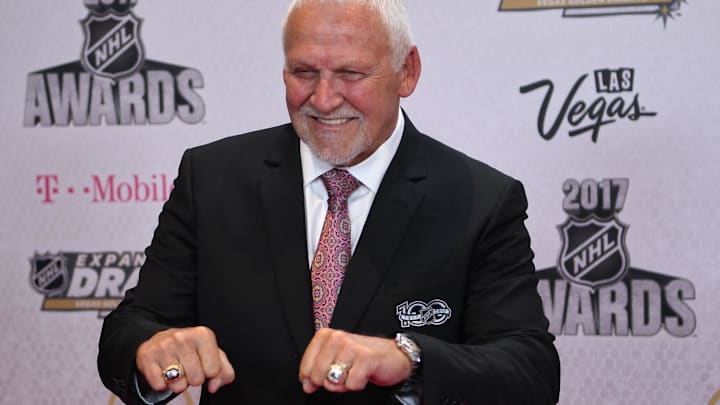Chances are, you were not among the 17,000 or so at The Spectrum on May 19, 1974. You may not have even been alive. If you are anything like most of us, your experience of the Flyers' first Stanley Cup victory was secondhand.
What an experience that must have been for those lucky enough to witness the Flyers take down the Boston Bruins in six games to win their first Stanley Cup.
The Big Bad Bruins
When the Flyers entered the NHL in 1967, they were built for speed and finesse. The team purchased the rights to the Quebec Aces' players. giving them an AHL affiliate and a pool of young talent. Simon Nolet was one of those players.
Nolet was an undersized speed demon who played on the right side and could easily find the back of the net. He was a player the Flyers may have coveted in those early days. The problem, however, was that there were ways to shut down undersized finesse players.
Whether or not speed kills, brute force leaves one hell of a mark. That's exactly what the Big Bad Bruins of the 1960s did. They beat you up and made you pay for trying to get the puck off the boards.
Leading up to the Finals, the Bruins dominated the Flyers on and off the scoreboard. The team held an all-time record of 30-4-4 over Philly, but Philly started their prep for this match a few years earlier.
The Broad Street Bullies
Without physically daunting teams like the Bruins, the Flyers never would have become the Broad Street Bullies. Philly's brass knew they could not win without making changes, and that meant they had to change the team's makeup.
Dave "The Hammer" Schultz played his rookie season in 1972-73 and, in 76 games, he amassed 259 penalty minutes, though plenty of other Flyers were in the same range. Schultz, Bob "The Hound Dog" Kelly, Don "Big Bird" Saleski, Gary Dornhoefer, and Andre "Moose" Dupont combined for over 1,000 PIMs.
There were tough guys, but they were not without talent. Dornhoefer put up 79 points in 77 games that season. Bobby Clarke, who will always be remembered as one of the original Bullies, racked up both penalty minutes and points, with 104 points in 78 games. Schultz potted 20 goals in his sophomore year.
Suddenly, the Flyers could put the puck in the net as easily as they could put a fist to your face.
Only the Lord saves more than Bernie Parent
That was the expression that became popular in 1975, but was built on the goaltender's body of work up to that point.
In his first three seasons with the Flyers, Bernie Parent had a save percentage of over .920 each year and eight shutouts. His fourth season was off to a good start, but halfway through it, he landed in Toronto as part of a three-way deal that brought Rick MacLeish to Philly.
MacLeish struggled during the 33 games he played in his first two seasons in Philly and wound up in the AHL. Everything clicked in the 1972-73 season, and he posted 50 goals and 50 assists in 78 games.
The offense was getting there, and so was the toughness, but there was still a missing piece. It was clear Bernie Parent was that piece.
Before the 1973-74 campaign, general manager Keith Allen reacquired Parent in a goalie swap that sent Doug Favell to Toronto. That year, Parent had 12 regular-season shutouts and won the Conn Smythe Trophy as the playoff MVP.
Kate Smith
On December 11, 1969, a recording of "God Bless America" was played before a Flyers game, much to the dismay of the team's owner, Ed Snider. The team beat the Toronto Maple Leafs 6-3 that night, after going 1-9 in their last 10.
Nearly every time they played Kate Smith's rendition of the song, the team won. In the 1973-74, Smith was brought in multiple times to sing the song live. That included the Cup-clinching Game 6.
The Flyers finished the 1973-74 regular season with 112 points, one shy of the league-leading Bruins. Both teams finished first in their respective divisions and swept their opponents in the first round. It took Boston six games and the Flyers seven to set up the ultimate showdown in the Stanley Cup Finals.
The Flyers were prepared for whatever Boston had to throw at them. The two split the first two games, each winning 3-2. Philly took each of the next two 4-1 and 4-2. Boston struck back in the fifth game to make it a 3-2 series. The Bruins trounced the Flyers 5-1 in that game, giving Boston a spark. The Flyers were ready to extinguish it.
After 17 goals were scored in the previous three games, a high-scoring Game 6 seemed imminent. It was anything but. At 14:44 of the first period, Rick MacLeish scored the first and only goal of the game. Bernie Parent backstopped the team to a 30-shot shutout, clinching Philadelphia's first Stanley Cup championship 51 years ago today.
Phil Esposito joked about how they could have played until June and still would not have scored on Parent.
Let's celebrate the anniversary with Gene Hart's call of the game's final moments.
